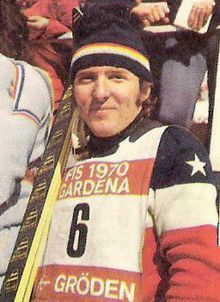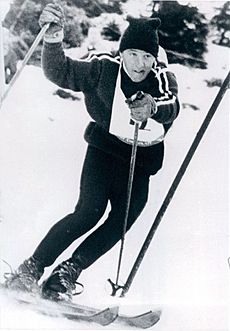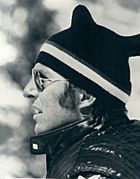Billy Kidd facts for kids
| Alpine skier | ||||||||||||||||||||||||||

Kidd after winning the world title in 1970
|
||||||||||||||||||||||||||
| Born | April 13, 1943 Burlington, Vermont, U.S. |
|||||||||||||||||||||||||
|---|---|---|---|---|---|---|---|---|---|---|---|---|---|---|---|---|---|---|---|---|---|---|---|---|---|---|
| Height | 5 ft 9 in (175 cm) | |||||||||||||||||||||||||
| Olympics | ||||||||||||||||||||||||||
| Teams | 2 – (1964, 1968) | |||||||||||||||||||||||||
| Medals | 1 (0 gold) | |||||||||||||||||||||||||
| World Championships | ||||||||||||||||||||||||||
| Teams | 5 – (1962–1970) includes two Olympics |
|||||||||||||||||||||||||
| Medals | 4 (1 gold) | |||||||||||||||||||||||||
| World Cup | ||||||||||||||||||||||||||
| Seasons | 3 – (1968–1970) | |||||||||||||||||||||||||
| Wins | 2 – 2 (SL) | |||||||||||||||||||||||||
| Podiums | 4 – 4 (SL) | |||||||||||||||||||||||||
| Overall titles | 0 – (7th in 1968) | |||||||||||||||||||||||||
| Discipline titles | 0 – (8th in SL & GS, 1968) | |||||||||||||||||||||||||
|
Medal record
|
||||||||||||||||||||||||||
Billy Kidd, born on April 13, 1943, is a famous former alpine ski racer. He was part of the U.S. Ski Team from 1962 to 1970.
At the 1964 Winter Olympics in Innsbruck, Billy Kidd and his teammate Jimmie Heuga made history. They were the first American men to win Olympic medals in alpine skiing. Billy won a silver medal in the slalom race. Six years later, Kidd won a gold medal in the combined event and a bronze in the slalom at the 1970 World Championships in Val Gardena, Italy. After that, he joined the professional ski racing circuit and had a very successful career from 1970 to 1972. He won the World Pro Ski Tour World Championships in 1970. This made him the only racer ever to win both FIS (International Ski Federation) and Pro titles in the same year.
Since 1970, Billy Kidd has been known as a "Legend" in skiing. He has stayed in the public eye through his job as Director of Skiing at Steamboat Ski Resort in Colorado, a role he held from 1970 to 2024.
Contents
Early Life and Skiing Start
Billy Kidd was born in Burlington, Vermont. He grew up in the 1950s in the ski town of Stowe. His parents, Bill and Betty, ran a motel there. With his father's encouragement and coaching, and support from the town, Billy became a top junior ski racer. He trained at Stowe with the Mount Mansfield Ski Team. Along with his best friend and skiing rival, Jimmie Heuga, Billy Kidd was chosen for the U.S. Ski Team for the 1962 season.
Billy Kidd's Racing Career
Billy Kidd first became well-known in his first season on the U.S. Ski Team. He was 18 years old. He finished eighth in the slalom and 15th in the giant slalom (GS) at the 1962 World Championships in Chamonix, France.
After a season with some injuries, Billy Kidd was determined for the 1964 season. He won a silver medal in the slalom at the 1964 Winter Olympics in Innsbruck. This made him the first American man to win an Olympic medal in alpine skiing, along with Jimmie Heuga, who won bronze in the same race. Both Billy and Jimmie were only 20 years old. Billy also finished seventh in the giant slalom and 16th in the downhill. Because he finished all three races, he was eligible for the combined event. This was not an Olympic medal event then, but it was a World Championship medal event. He earned a bronze medal for the FIS.
In 1966, before the World Cup series began, Billy Kidd won three important races in Europe. He was even skiing better than the famous Jean-Claude Killy. However, Billy suffered a serious injury, a left ankle sprain, which needed surgery. Later that year, he broke his right leg in two places during downhill training at the 1966 World Championships in Portillo, Chile. This injury also kept him out of the first World Cup season in 1967. During his recovery, he went back to college at the University of Colorado in Boulder.
The next year, in 1968, he finished fifth in the giant slalom (GS) at the 1968 Winter Olympics in Grenoble, France. He placed 15th in the downhill. He did not finish the first run of the slalom because of thick fog. After those Olympics, he won a World Cup slalom race in Aspen in March. He finished seventh in the overall World Cup standings, which was the best result for a North American skier that year. His first World Cup victory happened in Aspen, Colorado. His second win came a year later, also a slalom race in the U.S. at Squaw Valley, California.
At the 1970 World Championships in Val Gardena, Italy, Billy Kidd won the gold medal in the combined event and a bronze in the slalom. He said, "I'd always promised my mom I'd bring home a gold medal." After the World Championships in February 1970, Billy Kidd stopped competing in the World Cup. He immediately joined the new professional ski circuit, which was started by his former U.S. Ski Team coach, Bob Beattie. Billy won the pro championship that same year. This made him the only racer to hold world titles in both the amateur and professional circuits at the same time. Ongoing injuries led him to compete less in 1972, and he retired from the pro circuit that fall.
Billy Kidd graduated from the University of Colorado in 1969 with a degree in economics.
Hall of Fame Honors
Billy Kidd has been honored in several Halls of Fame:
- 1976: The US Ski & Snowboard Hall of Fame
- 1986: The Colorado Snowsports Hall of Fame
- 1995: The Colorado Sports Hall of Fame
- 2013: The Vermont Sports Hall of Fame
Life in Steamboat Springs
Billy Kidd moved to Steamboat Springs, Colorado, in 1970. Since then, he has been closely connected with the Steamboat Ski & Resort Corporation, where he works as its director of skiing. The year 2020 marked his 50th year in this job at Steamboat Ski Resort. Billy is easily recognized by his Stetson cowboy hat. He is an ambassador not just for Steamboat, but for the American West and the sport of skiing. For over 50 ski seasons, skiers and snowboarders could join Billy Kidd for a free daily clinic on the mountain. It happened at 1 PM at the top of the Steamboat gondola. Those who "skied with Billy Kidd" down the Heavenly Daze intermediate run received helpful ski tips. They also heard stories from Billy about what it's like to ski in the Olympics.
Billy Kidd also served on the Board of Directors for Special Olympics International. He was invited by the founder, Eunice Kennedy Shriver. He also served on the President's Council on Physical Fitness. He was on the board of the Jimmie Heuga Center, which helps people with multiple sclerosis. Billy has regularly invited Native American teenagers to Steamboat for annual "Future Olympians" weekends. During these weekends, they receive skiing and snowboarding lessons. Most participants come from the Ute reservation near Salt Lake City.
In the late 1980s, Billy Kidd appeared in the famous American Express "Portraits" advertising campaign. The photos were taken by Annie Leibovitz at his ranch near Steamboat. This campaign featured portraits of some of the most important people in the world. The slogan was "Achievers, visionaries, icons ... all with one thing in common." Besides Billy Kidd, other famous people in the series included Ella Fitzgerald, Sofia Loren, Arnold Schwarzenegger, Tip O'Neill, Eric Heiden, Ray Charles, Willie Shoemaker, and Wilt Chamberlain.
Billy Kidd also hosts ski outings for companies like American Express, Rolex, UPS, American Airlines, Time, and Sports Illustrated magazines.
Images for kids
 | Claudette Colvin |
 | Myrlie Evers-Williams |
 | Alberta Odell Jones |






